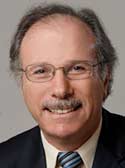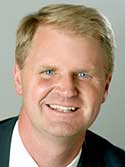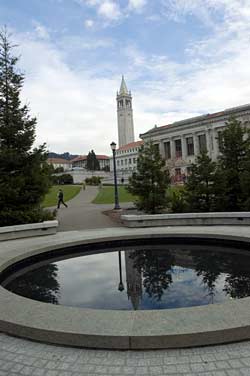The state of Berkeley's budget
A Q&A with two top campus decisionmakers yields insights into how Cal will deal with the most difficult fiscal environment in decades.
22 January 2009
BERKELEY — In a message to the campus community in mid-December, Chancellor Robert Birgeneau and Executive Vice Chancellor and Provost George Breslauer warned staff and faculty to brace for what could prove to be "the longest and most severe recession in the post-World War II era." While emphasizing the uncertainties surrounding the budget process — particularly the deepening cuts in higher-education funding from the state of California — they offered the assurance that "we are making every provision to protect and preserve the excellence of our institution while dealing with a very constrained budget situation."
The new year had barely begun, however, when the UC system learned its state funding had been slashed yet again. In light of the fluid budget situation facing the Berkeley campus — and the concerns of staff and faculty regarding the potential impacts of the financial crisis — the Berkeleyan met recently with Breslauer and Nathan Brostrom, vice chancellor for administration, for an update on the campus's plans for coping with the grim realities of today's economic climate.
The state's financial condition seems to be worsening daily, and the U.S. and global economies are a huge question mark. Given that the UC system is partially dependent on state funding — and that other revenue sources are being squeezed by recession — what can we say at this moment about the size and shape of the financial hole we're in here at Berkeley?
 George Breslauer
George BreslauerGeorge Breslauer: Well, we know that reductions in state funding forced us to take about a $15 million midyear cut for 2008-09; that is a cut to our ongoing campus funding, but by taking it centrally this year we have basically postponed its direct impact on campus units until July 1. We did this to contain the disruption that would have come from having to cut that much out of unit budgets in the middle of the year, when most activities have already been programmed and expenditures promised.
The governor's 2009-10 budget proposal [released earlier this month] adds to that $15 million a permanent $10 million reduction in state funds as the new baseline thereafter. And that is based on a fairly optimistic budget scenario.
 Nathan Brostrom
Nathan BrostromNathan Brostrom: In fact, the gap for '09-10 will probably be closer to $60 million. In addition to the just-noted $25 million, we are required to cover a growing number of unfunded mandates, which this year total $35 million: salary increases for represented staff; faculty merit increases; increases in health and other benefits; and a utilities bill that this year will be underfunded by $12 million. But there are still a lot of moving parts in this budget that we won't know for quite a while.
A memo you and Chancellor Birgeneau sent to the campus community in mid-December referred to a "fog of uncertainty" hanging over the campus, and you've just painted a vivid picture of what you meant by that. What are the challenges of budget planning in such an unstable economic climate?
GB: It's quite challenging. We don't know how deep the cuts will be when everything settles, next summer or fall. The governor's January budget is only an aspiration at that point in time. We don't know if this economy is going to be troughing in '09 or '10 or '11. So all of our decisions are part of a process of successive approximations.
What revenue we can count upon is also an unknown right now. What the UC Regents decide in the coming weeks about the levels of student fees is a critical issue. We hope for a significant increase in student fees that, with our financial-aid system, will not undermine the ability of students from lower-income households to attend Cal.
NB: One of the approaches I take to budgeting — because I agree with George, it's very frustrating if you're looking at just this budget cycle — is to try to take the long view, and to take steps to build toward a financial model that will be sustainable in five years, when we've come out of this economic and financial crisis.
Frankly, a lot of the actions we're contemplating to increase organizational efficiency, for example, won't yield that many near-term results. But I think we have to focus on those, so that when we do finally see some increased revenue from the state, we'll have built a leaner, stronger base, and more of that money can then be put toward enhancing our academic excellence.
The December memo also mentioned an "ever-expanding list of possibilities" for addressing the crisis. At some point that list needs to be whittled down, and some tough decisions have to be made. What's the process for doing that?
GB: The process was initiated at the level of the vice chancellors, at the request of the chancellor. A group of vice chancellors get together every other week to brainstorm about approaches to take toward both revenue generation and cost savings in the near term, as well as long-term structural changes that would yield cost savings down the road. This group broke the ideas we had into those that could save or generate more than $3 million, those adding up to $1-3 million, and those from $100,000 to $1 million.
In our last meeting, we focused on the big-ticket items to both generate revenue and reduce costs. We're now trying to decide how and when to pull the trigger to implement several of those ideas.
Can you give us an example?
GB: One unavoidable measure is being done at many UC campuses already — a staff hiring freeze. Hiring freezes always have exceptions built into them, because we can't take an action that will cripple entire enterprises. But at the same time we can't continue with business as usual. For example, what if we saw a large number of employees who are paid by state funds leave the university? With a strategic and thoughtful hiring-freeze strategy, we could see large savings.
That's why the chancellor and I said in our letter to the campus that we're going to try to avoid large numbers of layoffs by focusing on a freeze that will save money through attrition. That's a tricky process, and we're still trying to work up a mechanism for implementing a hiring-freeze with conditionality — that is, one that clearly specifies the terms for exceptions.
 Even without layoffs, though, we're facing the prospect of fewer staff to do the work of the university, correct?
Even without layoffs, though, we're facing the prospect of fewer staff to do the work of the university, correct?
GB: Yes. A hiring freeze will hopefully avoid mass layoffs, though there will surely be pockets of layoffs. But the bad news is that a freeze leaves fewer staff doing the same amount of work.
We're looking in great detail at ways to reduce the workload on our staff by suspending certain things that we currently ask staff to do. In the last 10 years a lot of responsibility on campus has been decentralized. This looked like a great idea a decade ago, when people in academic departments said "we can deal with bureaucracy less by doing it ourselves." But after a while, so many responsibilities accumulated that it started to look like a blizzard coming down on staff, and it really increased the sense of stress in the trenches without significantly reducing workloads in the central offices.
[Holds up sheaf of papers.] This is our "list of ever-expanding possibilities." It goes on for many pages, and includes a number of good suggestions for things we could do in the area of workload reduction. We've been informally soliciting many of these ideas from staff about improving efficiency and eliminating unnecessary work, and I'm confident we'll hone these ideas into positive actions.
NB: A lot of these ideas are already happening in my units, where we're undertaking thorough business-process analysis and exploring the possibilities for clustering administrative functions. Some of it is looking at basic thresholds, like where you need approvals for certain purchases, or how many people you need to review and sign off on travel. And in streamlining those, without sacrificing compliance with policies or regulations, we should be able to reduce workload quite a bit.
Ultimately, I think a lot of these workload reductions will require technological solutions, and we're moving forward with developing those, even in the face of this financial crisis.
Tenured faculty positions can't be cut, but Berkeley has slowed faculty hiring considerably. What are the potential impacts of this slowdown, if any?
GB: It looks like there will be no cost-of-living increase for faculty again this year. It's not an option for us not to fund merit increases for faculty, due to a legal precedent set about 20 years ago. But the combination of no cost-of-living increase and a slowdown in faculty hiring means that, in about 18 months, we will begin to see a modest reduction in the total size of the faculty on campus Whether in the end that becomes a 5 percent, 10 percent, or 15 percent downsizing will depend on how bad this recession proves to be.
Can you elaborate on this slowdown?
GB: We typically conduct about 100 faculty searches a year, and last year we authorized 131 such searches. This year we've reduced that to 25, and next year it will be about 25 again.
In all of our deliberations on faculty issues, we've been consulting with the chair and vice chair of the Academic Senate, who have received materials from the vice chancellors' group that is examining budget actions and have given us feedback. We've also met with CAPRA, the Academic Senate committee on resource allocation, and with the senate's Divisional Council. So there's been considerable communication with groups within the Academic Senate.
And what's in store for students?
GB: The good news is we are trying to protect the temporary academic-staffing budget, meaning we're working to maintain the capacity of the campus to field a curriculum that will be robust enough for students to be able to get into the courses they need. At the same time, we are planning that there will be a 9-10 percent increase in student fees. In this scenario, a 10 percent increase on a $7,500 education-fee base — $750 times 30,000 undergraduate students equates to $24 million. Then, after putting $8 million of that back into financial aid to cushion the blow for those who can least afford another $750, we end up with $16 million in new revenue.
So students will pay more, and we want to make sure that they do not get less.
Some of the items on your list are already being implemented, others are planned, and still others are under consideration. Can you give us a sense of where we are in the process of wrapping our arms around this financial crisis?
NB: To put it in context, we're starting this budget months earlier than we normally would. Ordinarily, the chancellor's budget letter would go out in January. We started working on this right after the Legislature passed the last budget, when we could see the extent of the problem ahead — that this year's budget was in distress, and next year's would be a train wreck. And so that's when we formed the vice chancellors' group to start looking at all options. We have also tried to communicate more broadly with the campus about what to expect.
GB: In terms of steps taken so far, on the cost-savings side there's the slowdown in faculty hiring, the soft hiring freeze — not announced, but effectively decided, with just the shape of it yet to be worked out — and further promotion of the voluntary START [Staff and Academic Reduction in Time] program for employees who are willing and able to cut back their work schedules.
For next year, Berkeley is increasing the payers of nonresident tuition in our undergraduate student body, newly admitted from high school, from 10 percent to 13.5 percent. All told, 88 percent of our students will be California residents, and 12 percent will be from other states or countries. And that will generate significant revenue.
As for ideas in the pipeline: To generate revenue, we're working on ways to refresh the business models of many auxiliaries on campus that bring in money. On the cost-savings side we're looking, among other things, at ways to expand administrative clustering campuswide. We are also investigating to see if it would be possible to offer modest early-retirement or separation-incentive plans for faculty and staff.
NB: One opportunity we have in this economy is that we can purchase buildings at reduced prices now. We have access to the capital markets and low rates; if we purchased buildings for campus use, our debt-service payments would be roughly equivalent to what we're paying in rent now, and we'd be building up equity. And that would eventually yield savings for the campus.
Recognizing that the end of this recession isn't yet in sight, how optimistic are the two of you that UC Berkeley can manage to keep its core mission intact until the storm blows over?
GB: You have to be optimistic if you're going to come to work every day. You have to assume that what you're doing, or trying to do, is going to make a difference. And I say that with all sincerity. If the revenue enhancements come through with respect to both nonresident tuition and increases in regular student fees, and others that we're thinking about, and if this recession is closer to 1975 than 1932 in its severity, I think we'll be fine.
One of our biggest challenges is that we've built a university here that is very highly ranked in all of its sectors — social sciences, arts and humanities, biological sciences, physical sciences, and the professional schools. And so you don't have the luxury of saying, OK, we'll lop off that sector and maintain the excellence of the rest. Some universities can do this when they have manifestly weak sectors. Maintaining this breadth and depth — while at the same time trying to make the revenue generation and cost saving come to a new equilibrium that we can sustain — is the biggest challenge.
These economic pressures are not just a California problem, of course, but a national and global problem. Our peers among private universities are suffering, too. So with their endowments seeing a downturn of 30 to 40 percent, our competitive position can remain strong.
NB: My best projection is that the next couple of years are going to be chaotic. But I'm very optimistic that we will emerge from this a stronger university. I think we have lots of opportunity to restructure, to rethink how we deliver services. Frankly, this kind of crisis gives us a stronger and more compelling push to look at these things.
Getting there, and living within our means to do it, means people are going to be scrambling. There's a lot of work that still needs to be done, and if we have a hiring freeze it will take greater productivity to get it done. But I do think we have the means, and the will, to get there. And I think if we look out three years from now, we will have built a stronger base to sustain the comprehensive excellence that George is talking about.
As we go forward, we remain committed to keeping everyone informed of what we know, and what we don't know, because we're all in this together — and we need to be to get through these rough financial times.

